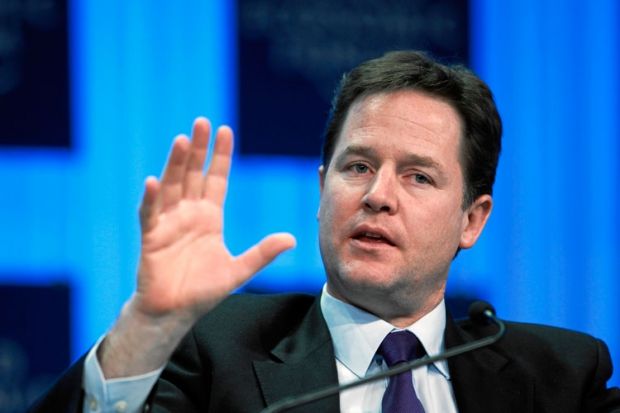Source: World Economic Forum from Cologny, Switzerland
The new proposal, to be voted on at the upcoming Lib Dem autumn conference, is likely to bring fierce opposition from some delegates.
Although the majority of Lib Dem MPs voted to treble fees or abstained in 2010, the party’s official party policy, decided by its conference, remains that it will phase out fees.
Conference delegates will also be asked to support plans to create a single higher education regulator, to set up a review looking at the impact of the student loan system on the national debt, to introduce a postgraduate loans system offering loans of up to £10,000 a year, and to remove international students “from the immigration figures”.
Uniquely among the major political parties, the Lib Dems give conference delegates the chance to vote on party policy at their autumn conference.
A policy motion to be put to this year’s conference, to be held in Glasgow in mid September, states: “The current system of higher education funding represents the best deal for students and taxpayers currently available.
“Further, that alternatives such as a graduate tax have a number of obvious failings, which would place an additional burden on low and middle income students and graduates, as well as a substantial extra cost to the state.”
Vince Cable, the business secretary and senior Lib Dem, has in the past spoken in favour of a graduate tax, as has Labour leader Ed Miliband.
The Lib Dem proposals on higher education are part of a larger policy motion on Lifelong Learning. The motion is the result of a policy paper written by a Lib Dem working group on post-16 education, led by Liberal Democrat peer Sal Brinton, a former bursar at two University of Cambridge colleges.
The motion also states that “the numbers of qualified young people attending university should increase over time”, and that “the higher education system should be more flexible for students, including transferring between universities and using online methods of learning”.
And, echoing the Browne Review, the motion calls for the creation of “a single Higher Education (HE) Council, incorporating the current Higher Education Funding Council, the Quality Assurance Agency and the Office of Fair Access – the HE Council will conduct an annual review of the impact of the funding and maintenance regime for both full and part time students and report to Parliament and the social mobility tsar”.
The new regulator will ensure that “institutions are transparent about their financial viability, working with the HE Council to produce an annual report”, the motion adds.
It also calls for a review of the current higher education funding system within the next Parliament, examining the system’s impact on “access, participation and quality – this review should consider both the pressure on the Public Sector Borrowing Requirement from unpaid loans and progress made on widening and increasing participation”.
If delegates decide to support the proposals, they will become official party policy. The manifesto for the 2015 general election will be written by the party’s Federal Policy Committee “based on the agreed policies of the party but updating them where necessary”, according to the Lib Dem website.
Register to continue
Why register?
- Registration is free and only takes a moment
- Once registered, you can read 3 articles a month
- Sign up for our newsletter
Subscribe
Or subscribe for unlimited access to:
- Unlimited access to news, views, insights & reviews
- Digital editions
- Digital access to THE’s university and college rankings analysis
Already registered or a current subscriber? Login




